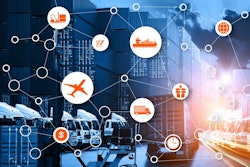
As companies expand globally and become increasingly more complex, it is imperative to have a secure, reliable and efficient supply chain management strategy in place. Regardless of industry, all parties along a supply chain can better protect their business and experience increased operational efficiencies by leveraging a decentralized blockchain.
In short, decentralized blockchains provide a digital supply chain ecosystem that is controlled, regulated and verified by users themselves. Every transaction on this blockchain occurs simultaneously and independent of each other, empowering users to hold each party accountable for their activities and giving them a better, faster way to identify bottlenecks, errors and discrepancies across the supply chain.
Leveraging the blockchain for supply chain management offers improved traceability, transparency and collaboration amongst the manufacturers, suppliers, warehouses, carriers, distributors and retailers across the supply chain while allowing them to reduce costs and better serve their customers. With the right security measures in place, blockchains also allow these parties to successfully combat fraud, counterfeiting and ransomware.
Traceability. Product and food recalls are accompanied by revenue loss, replacement costs, damaged brand reputations and even lawsuits. This is especially true in the food industry, which is constantly plagued by food mislabeling and fraud related to country of origin, product weight, nutritional information, labeling, packaging and expiration dates. When recalls happen, companies must act quickly to trace faulty materials and/or ingredients because lives are often at stake. Thanks to a blockchain’s distributed ledger – an immutable record of every transaction and activity – companies can track the product from origin to destination. The ability to trace 24/7/365 is critical to supply chain success and holds all parties accountable for their deliverable(s).
Transparency. Blockchains eliminate missing information and address blind spots in the supply chain because they offer a time-stamped recording of every activity – from inventory management to order fulfillment to payment. Each piece along the supply chain puzzle is assigned a unique identifier (digital token). Users are also given unique identities, which they use to sign the blocks they add. Once added, that specific activity (transaction) is recorded as a digital token. This transparent, tamper-proof record occurs for every transaction across the supply chain and is a game-changer from an auditing and compliance perspective.
Collaboration. Facilitating collaboration and connection with all parties across the supply chain means better communication, increased accountability and less room for error. If a faulty product or contaminated food is discovered, blockchains allows supply chain partners to quickly trace the product, identify the suppliers involved and pinpoint production location and associated shipment batches. The ability to immediately identify and notify necessary parties expedites the recall process – particularly if the product is perishable. The constant sharing of insight, best practices, and information in real-time over all parties on the blockchain increases efficiencies and saves everyone time and money.
Cost reduction. Blockchain-based supply chains can transform many industries because they enable faster and more cost-efficient delivery of products thanks to traceability, transparency and improved communications. Additionally, they automate many procedures and processes by eliminating the middleman, manual-intensive activities, paperwork and more. For large industries involving many participants, constant data monitoring and extensive record keeping, this translates into considerable cost savings. Blockchain technology increases efficiency because many transactions can be completed simultaneously, easily and quickly between buyers, suppliers and financial institutions, and that translates into lower costs for everyone.
Borderless blockchains
As global supply chains become more complex, blockchains dramatically reduce exploitative behavior particularly in lawless and corrupt countries where raw materials and minerals often originate. Blockchains work beyond borders and help verify product authenticity regardless of how many international parties are involved. They also give regulators and customs officials an efficient, transparent tool to monitor and engage with all parties across a supply chain, regardless of location.
Avoiding attack
Even with the best cybersecurity and endpoint protection systems in place, organizations doing business on the supply chain are not immune to an attack. In fact, supply chains are one of the first places hackers look because they are often the easiest route to gain access to an otherwise highly guarded system (and the sensitive data and information on it).
Attackers prey on open-source projects by infecting the upstream portion of the supply chain by exploiting third-party vulnerabilities and/or supplier networks. This is often accomplished by a phishing email downloaded by unsuspecting parties or by a malicious code snuck into a software update automatically pushed out to parties downstream. These types of supply chain attacks – particularly in transnational transportation – were up 430% in 2020.
Much of the concern around the adoption of blockchain-based supply chains focuses on the transparency of confidential data and the risk of that data being exposed to competitors, the public, volatile governments and more. Recent ransomware attacks on food processing, financial services and educational industries have raised additional concerns regarding blockchain safety and security.
However, emerging blockchain security technologies are making user data and assets impervious to hackers. Zero-trust, distributed identity and password-less solutions offer deterministic protection against advanced attacks. Biometric identity protocols require a fingerprint or face ID for users attempting to access the blockchain, which means that unless a person is physically kidnapped, no one can ever gain another individual’s access or obtain their digital assets. Blockchain-based supply chains must implement security protocols like these because they guarantee the security and safety of all parties and their assets, offer intellectual property (IP) protection and prevent an attack.
Revolutionizing the industry
Like the rest of the world, supply chain ecosystems are undergoing their own digital transformation. Connecting supply chain activities via smart and Internet of Things (IoT) technologies gives companies real-time insights into their asset status and location and allows them to scale quickly, mitigate risks and be more responsive with each other. They also allow brands and suppliers to quickly and accurately provide product, order and delivery information about their product(s), thereby holding brands accountable and giving consumers the information they want to make more educated buying decisions.
When coupled with these technologies, blockchains provide supply chain management further transparency and traceability because they can monitor the actual conditions of production, transportation and quality control. A refrigerated shipment that falls below a temperature threshold can now automatically be recorded thanks to an IoT device directly connected to the blockchain. Artificial intelligence (AI) can now analyze big data across the chain and pull useful insights for manufacturers and suppliers regarding product management and inventory predictions.
Blockchains provide a traceable, transparent and trusted real-time digital record that greatly improves supply chain operations and communications, reduces costs and enables quicker and safer delivery of products. Suppliers and manufacturers are recognizing the potential of decentralized blockchain solutions to transform their business operations and offer a better customer experience and the revolution has only just begun.



















